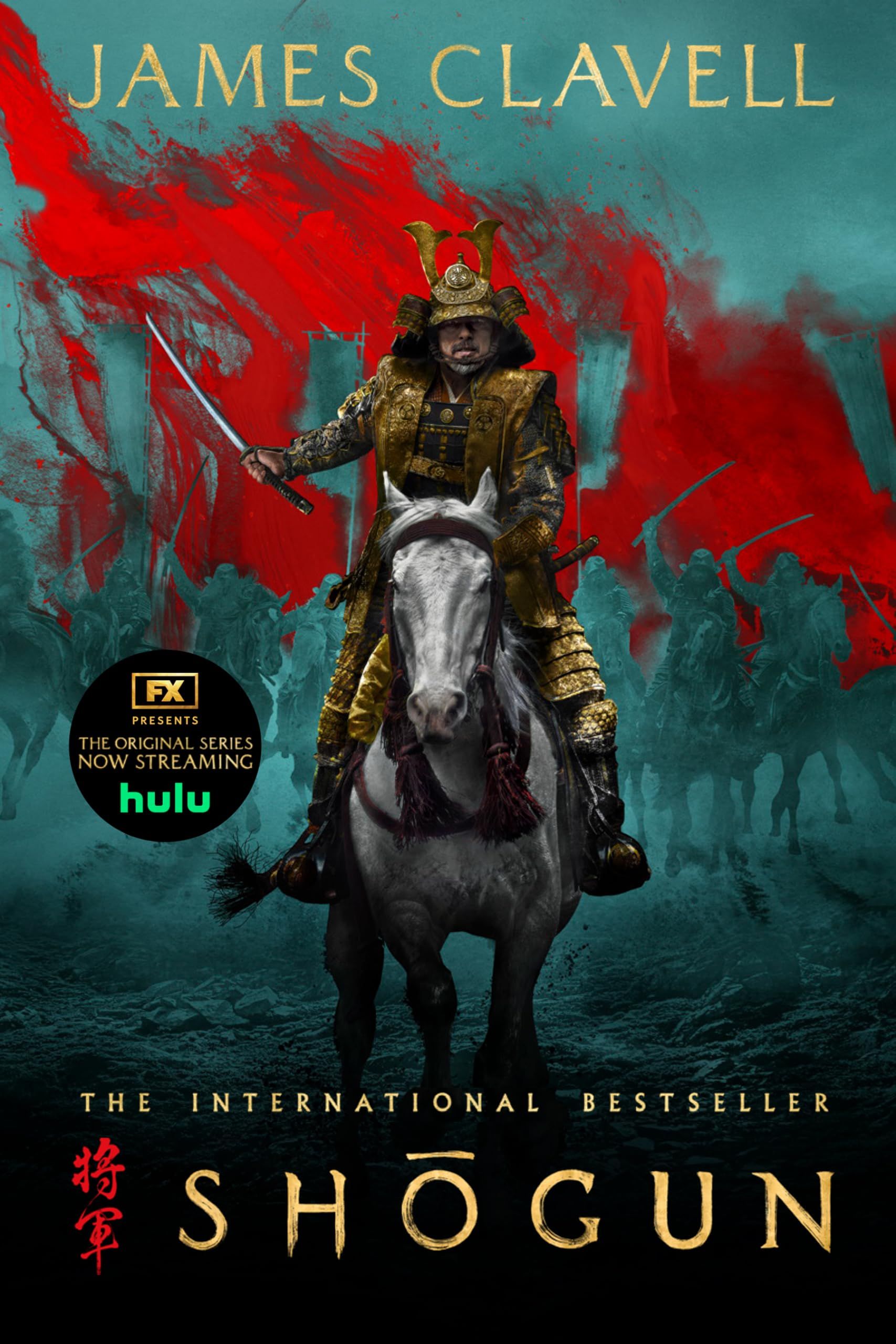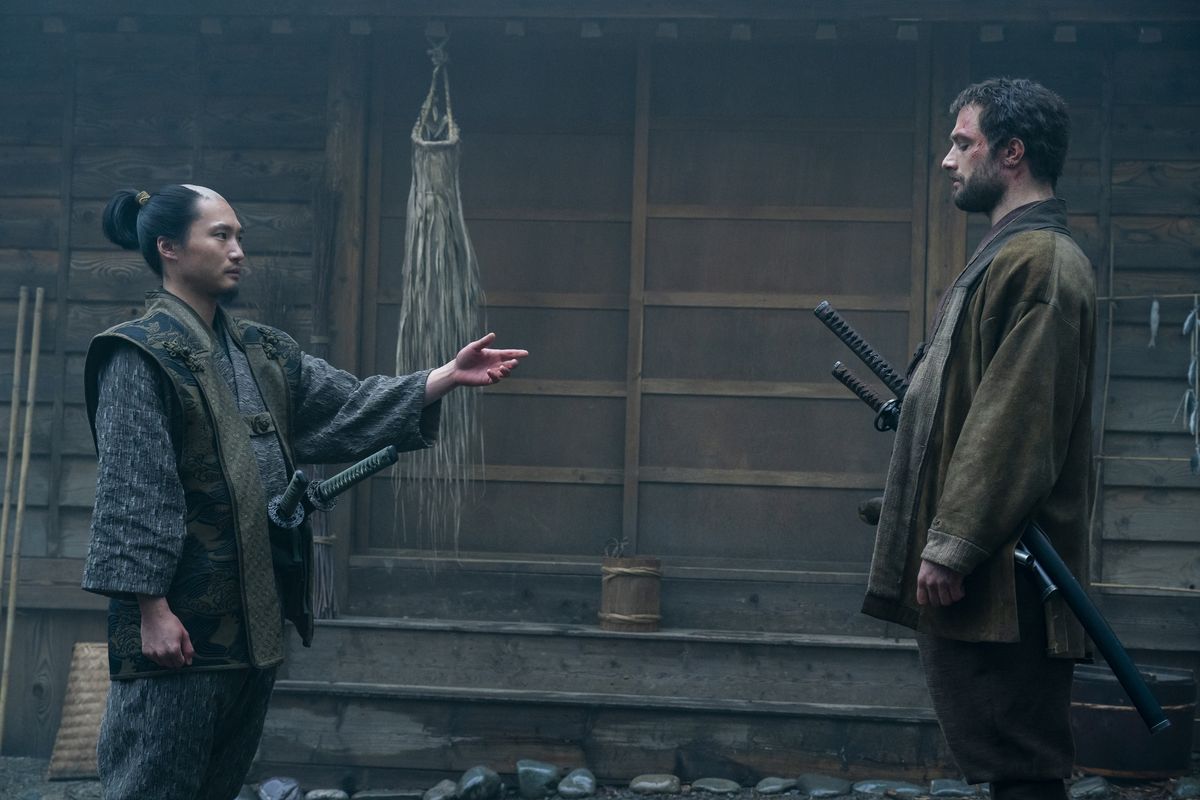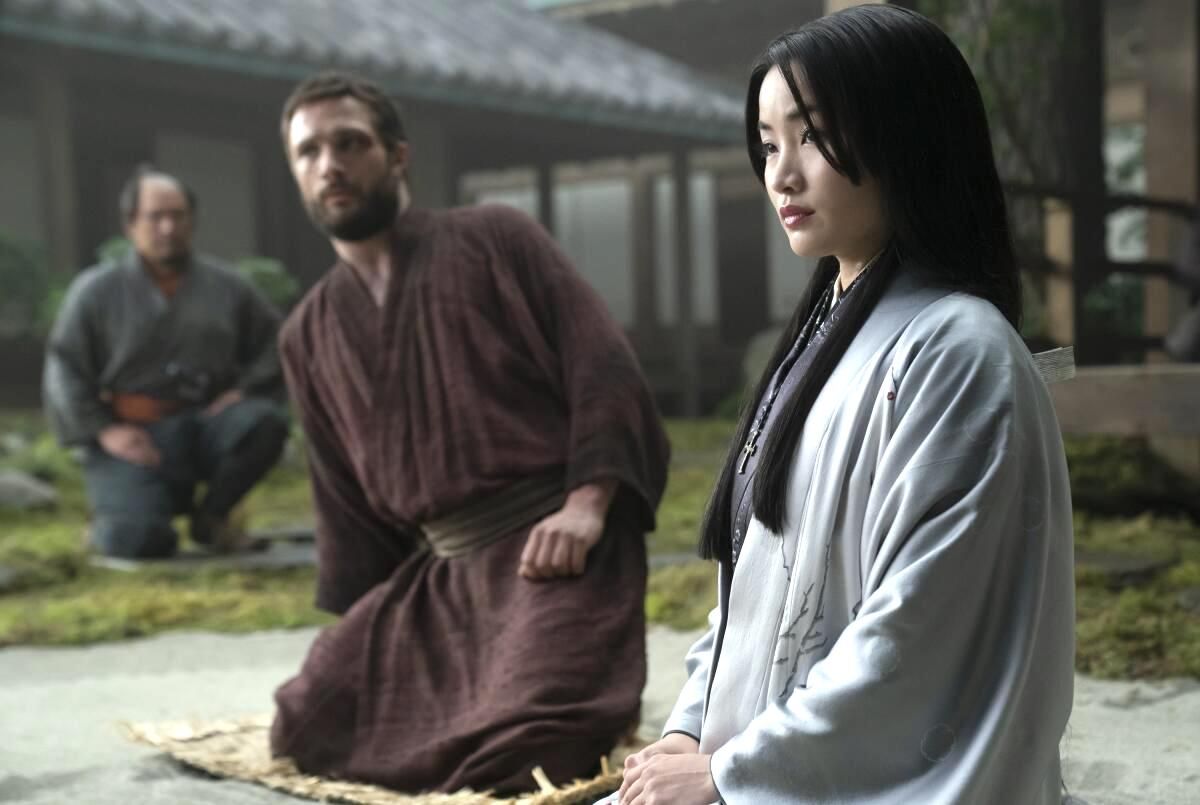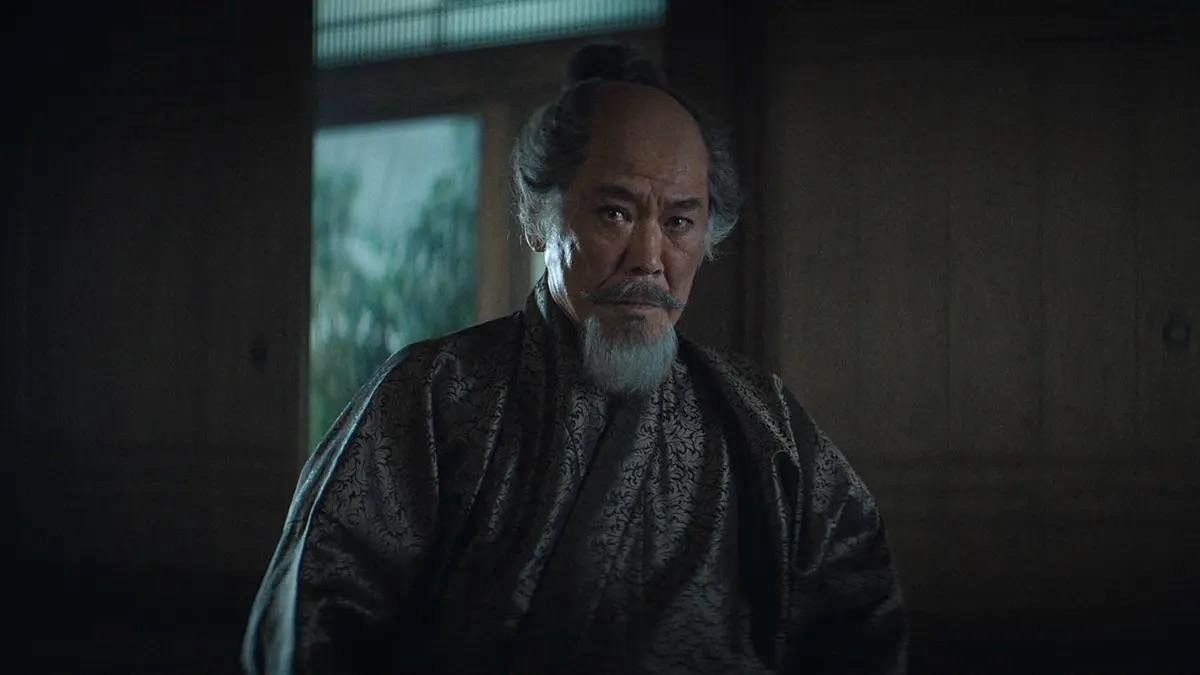FOR THE TEAM of Justin Marks and Rachel Kondo, life falls into two distinct categories: before Shōgun, and after Shōgun.
“We get to look back and remember, because we were just wildly different people,” Kondo tells Men’s Health. In the roughly five years it took for the married creative duo—both co-created and executive produced the show, with Marks leading the charge as showrunner—to bring the FX adaptation of James Clavell’s novel to life for a new generation, the pair had children and, in fact, “no clue” what was set to be in front of them. In fact, the show’s eventual reception was something Marks spent a good amount of time thinking about. “When you’re trying to design the car while driving it, it takes a lot out of you,” he says.
Audiences now know what they spent all that time building toward. Shōgun’s conclusion just aired, bringing with it a definitive end, albeit in a different way than most possibly thought. There’s no massive battle; instead, it’s largely a series of quiet, character-driven moments as Toranaga (Hiroyuki Sanada) unfurls his grand plan to become the titular Shōgun, while John Blackthorne (Cosmo Jarvis) accepts his place amongst the Japanese people after grieving the loss of Mariko (Anna Sawai).

Shōgun: The Complete Novel
$40.39
Men’s Health has a small perspective into the after portion of Marks and Kondo’s lives, having attended an event for the show at the Winter Television Critics Association Winter Press Tour in the wake of rave reviews for the series, as well as a special event at the Motion Picture Association’s offices in Washington, DC on the night of the series premiere—which we mentioned to the pair. The latter event, in particular, was a slightly emotional affair, as it marked the final stop of a global press tour and the last time the key players—including Marks, Kondo, Sawai, and Sanada—were all together. There was a palpable sense of closeness between everyone on stage, but especially between Kondo and Sawai, as they both discussed what the series meant to them.
Now, with the finale out in the world, Kondo and Marks are responsible for not only what will likely be the year’s best show—but one of the best shows of this (still early) decade. In a spoiler-filled conversation about the finale with Men’s Health, the two spoke about how Sawai and her portrayal of Mariko became the show’s emotional center, how the two creatives thought about the themes of trust and faith, their approach to endings, and much more.
MEN’S HEALTH: How do you construct endings? Did Shōgun’s differ in any way?
JUSTIN MARKS: The nice thing about an ending is that you write to it, and you know what that moment is. It’s an emotional truth. We always knew, somehow, it was going to end on a simple look between Blackthorne and Toranaga on that beach, while he’s back on his b******* again, pulling the ship out of the ocean. But now realizing it’s his b*******. The silent acknowledgment of, ‘Well played. This is the game, and I played right into it,’ between him and Toranaga. It was always that, and then how you get to that, but how spiritually you get to that was 1,000 different possible answers. That’s exciting, because the one that ends up happening is the one that will surprise us. It’s taking Blackthorne along this mostly familiar Rogue’s journey towards self-awareness and enlightenment that has nothing necessarily to do with his culture, although, of course, really, it does. It’s this idea that he’ll turn his back on one version of his life unlived, and move forward on a different path now, one of surrender.
The fun of the show is that you think he comes to a foreign land and is going to show them his awesomeness. They’re going to key into his awesomeness, and then his awesomeness will make a difference. In the end, it doesn’t make a shred of difference. That was always the case in the book; the only key was that Blackthorne realized how little his place was.
RACHEL KONDO: The only difference he made was the realization that this world and these people existed before him, and would go on long after he departed. It was his journey to that realization that had the effect, rather than his ideas and his machinations.

shogun finale blackthorne
MH: What went into the decision to open the finale with a flash-forward to an old Blackthorne? Was that a fun framing device for you guys?
JM: It was entirely a framing device, and it was an invention of the book that we wanted to do as a writers room, this idea of doing a bit of a faint…
RK: A departure from the book.
JM: What did I say?
RK: Invention of the book.
JM: Yeah, no, we invented it. So if you don’t like it, it’s all our fault. We had this faint idea that we wanted to start with a moment where it was about an old man looking back on his life. We’ve seen this structure before for finales. Instead, you get to later realize it was actually the projection of a young man looking forward onto a version of his life that he no longer wanted. Blackthorne, in this moment of seppuku, is deciding to kill that self, that possible self. He then follows through on it when he drops his cross into the water—which makes it so that future is not possible, because he had the cross in that scene.
We really love the idea that he’s staring into that abyss of himself—the version of himself he would have become had Episode 1 Blackthorne just aged. It would have been someone who lives in a grand house: here are my heirs, they’re doing all these things, but I’m empty. To quote Mariko in Episode 5, ‘I am not free of myself and never have been.’ This is the final liberation he achieved. We really love that motif coming through. It was key for us to put the readers of the book on their heels from the very beginning of the final episode, and to get them to think, ‘Okay, well, this is new. Where are they going with it?’
MH: You mentioned the scene on the boat with the cross. Can you tell me about the atmosphere on set that day? How Cosmo Jarvis and Moeka Hoshi play that moment is really beautiful.
RK: That’s also a departure from the book.
JM: I have to credit one of our producers, Mako Kamitsuna, with developing the kernel of that, because we were talking about ways to keep Mariko’s spirit alive in the story. It felt appropriate for the two of them to mourn her together. It was a tough scene to do because that was all practical. It wasn’t green screen out there. That boat was rockin’. It felt very raw in the performance, in a way I was really proud of. They both come to it from a very vulnerable place.
RK: And from very different places, too. Fuji came at it from a Japanese place, this idea of pouring the ashes of her children; these are ashes meant to be stored in a family vault. They hold on to them. The idea of pouring them is so antithetical, and yet the idea that Blackthorne would release this cross, whereas the Westerner would want to cling to something. That’s what the rawness is from. They were actually coming at it from their unique perspectives. It became uniquely Blackthorne and Fuji.

did mariko die in shogun episode 9
MH: Mariko and Anna’s performance are really the emotional core of the show, leading us through this, and that realization has really informed my own viewing of the show. Was that something you keyed into right away while digging into the material? Was that something that naturally came up through the writing process? Or was it through Anna’s performance?
RK: It’s a great question. Starting out, I was obviously drawn to her as a character, but I just in no way could have anticipated the depths and the profundity. We were drawn to all of the characters at different points, but for Mariko, every leg of the journey was deepened. The last deepening happened when I met and got to work with Anna. There’s no untangling the two anymore. I can’t tell one from the other. I didn’t know it would have the meaning that it had to me.
I feel silly talking about it, because I feel so profoundly affected by the character in that I got to take a look at my own heritage, my own past, my own Japanese grandmother, all these things that feel so specific to me, but I feel like anybody who connects with Mariko as a character can say that. I hope that they do, at least, because her story is her story. But it’s also my story. It’s any woman’s story who has struggled to find a voice, or struggled to find words to put to that voice.
MH: You mentioned Blackthorne’s recognition of Toranaga earlier. When I think about his character, what often comes to mind is ambiguity—in a good way. Because if it’s written the wrong way, it can become frustrating for the viewer. How do you find the balance of making his plans ambiguous enough that the audience isn’t four steps ahead, but without making him a complete cipher to the audience?
RK: You said ambiguity in a good way; my mind went to ambiguity in a necessary way. That was his advantage. He was simply the person who didn’t fight against ambiguity, who allowed for ambiguity because ambiguity is the same thing as possibility.
JM: People tend to put together confusion and mystery. We want mystery and not confusion. To do that, sometimes you have to find truth. That comes down to the performance. I’ve noticed some talking and pondering about Hiromatsu (Tokuma Nishioka) and Toranaga, and whether or not they planned the seppuku theater they carried out. To us, the answer was very definitively no. What Toranaga understood to probably happen is that these generals are going to probably kill themselves in protest. That’s very sad, but for his plan, very necessary, so that Osaka thinks it’s done…
RK:…and he’s defeated.
JM: What happened that was unexpected in that moment is that Hiromatsu decides to not let them die, and says, ‘If this is really your plan, I’m gonna do it.’
RK: Hiromatsu also understood his death would bear more weight than these randos—not that they’re randos, but to us, they’re randos. Hiromatsu couldn’t have done that if he had a conversation with Toranaga. Toranaga would have talked him out of it. He wouldn’t allow it. Ambiguity was there in the performance because he could have fought against it right then and there.
JM: There was a key moment on set with Hiro (Sanada) that day when we asked, ‘Just pick your moment when you’re going to look at him with a No, you idiot! Not you. What are you doing? face. We use that in the cut in a very specific way; you can see it on his face. That’s what I mean by ‘acting is the key to mystery/confusion’. There’s no mystery or confusion in Hiro’s performance in that moment. He’s trying to tell him not to do it, but as soon as he said it out loud, it’s over. Hiromatsu has to go through with it. Now, he’s trying to give him every possible out, but knowing that he can’t and that he won’t. What’s done is now done.
Another moment we have, which you can see on Toronaga’s face as Hiromatsu is gutting himself, is ‘Thank you.’ To go from that to gratitude is just beautiful on every level, and is a master class of acting for both of those actors who have a long history together in Japanese cinema. It’s really fun to watch.
RK: The whole thing was underscored by their affection for each other, both as characters and as people and actors.
JM: Which reminds me, I have to get that picture—now that it’s not spoilers, I can throw it on social media—of Tokuma-san holding his own severed head.
RK: Mmmh, that’s nice [Laughs.]

hiromatsu
MH: I keep coming back to the idea of faith or trust. The faith and trust the characters have in one another, their actual spiritual faith, the faith and trust you had with your collaborators. You had to trust your Japanese collaborators when they came to you about a comma placement in the subtitles. That extends to the audience, and the idea they would trust you as you paced the show a little more deliberately and patiently. How much were you aware of that thematic element throughout this process?
JM: I’d be lying if I said that wasn’t a key part. The Blackthorne-ian journey—a journey towards surrendering to the pattern of events—was a really important thing for us. Selfishly, that changed the way I’m going to make shows moving forward. I was never an auteurist. I think auteurism is total b*******, especially in film when we say it for directors, but I also believe it’s b******* in television that the writer/producer is the author of this work. I don’t believe that. I believe the writer/producer is the author of a process. And the process is the author of that work.
I came to that by producing Shōgun and realizing how much of it is you have to let go and surrender yourself like Blackthorne surrenders himself, like Toranaga surrenders himself, to the pattern of events. And letting your hope be the compass that guides you, or the strings you pull on a kite. But letting the wind take it where it’s going to take it and trusting that the process is leading somewhere, because you went into it with an honest intention to tell this story, is vital. You can’t hold those strings too tight. The characters in Shōgun who hold on too tight are the ones who die.
RK: I like those word choices: the faith, and the trust. The word I would add to that is a loyalty to the process, allowing the process to be the reason why you can let go. Because you can trust that process, right? It’s like the Japanese social hierarchy. You had your Lord, and you would die for this Lord. You have this thing to look to—be it for better or for worse, or for good or for bad—you’re going to allow to lead you. It takes the pressure off of you to be the genius behind it all, because you don’t have that genius. It’s the process that makes that genius.
JM: So yes, is the answer. We think about that a lot.
RK: Yeah.
JM: A lot.
This interview has been condensed for content and clarity.
Try 200+ at home workout videos from Men’s Health, Women’s Health, Prevention, and more on All Out Studio free for 14 days!
News Related-
The best Walmart Cyber Monday deals 2023
-
Jordan Poole took time to showboat and got his shot blocked into the stratosphere
-
The Top Canadian REITs to Buy in November 2023
-
OpenAI’s board might have been dysfunctional–but they made the right choice. Their defeat shows that in the battle between AI profits and ethics, it’s no contest
-
Russia-Ukraine Drone Warfare Rages With Dozens Headed for Moscow, Amid Deadly Winter Storm
-
Trump tells appeals court that threats to judge and clerk in NY civil fraud trial do not justify gag order
-
Can Anyone Take Paxlovid for Covid? Doctors Explain.
-
Google this week will begin deleting inactive accounts. Here's how to save yours.
-
How John Tortorella's Culture Extends from the Philadelphia Flyers to the AHL Phantoms
-
Tri-Cities' hatcheries report best Coho return in years
-
Wild release Dean Evason of head coaching duties
-
Air New Zealand’s Cyber Monday Sale Has the 'Lowest Fares of 2023' to Auckland, Sydney, and More
-
NDP tells Liberals to sweeten the deal if pharmacare legislation is delayed
-
'1,000 contacts with a club': Tiger Woods breaks down his typical tournament prep to college kids in fascinating video
